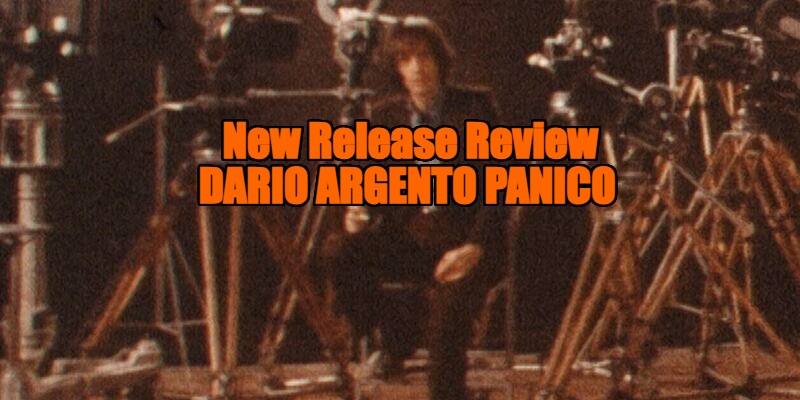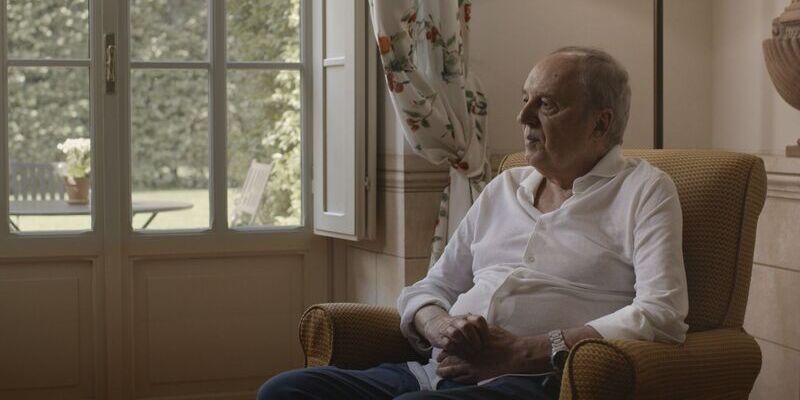
Dario Argento's life as told by his family, friends, collaborators,
admirers and the filmmaker himself.
Review by
Eric Hillis
Directed by: Simone Scafidi
Featuring: Dario Argento, Asia Argento, Guillermo del Toro,
Nicolas Winding Refn, Gaspar Noe, Cristina Marsillach, Claudio
Simonetti

Italian auteur Dario Argento has already been the subject of
several documentaries, so what can director Simone Scafidi – who
previously profiled another Italian horror icon with 2019's
Fulci for Fake – offer with
Dario Argento Panico that we haven't seen before?
While previous films about Argento have focussed on his filmmaking,
Dario Argento Panico is more concerned with getting inside
his head, asking who is Dario Argento the man rather than the
filmmaker.

It's a question it never entirely answers. That's not a slight against
the film, as Argento is a supremely enigmatic figure who has practically
been consumed by his own myth. Scafidi does get the iconic filmmaker to
bare his soul at points. At one stage Argento recounts having suicidal
feelings that almost drove him to jump from his hotel window. So
convinced was he that he would make the fatal leap at some point that he
placed a heavy wardrobe in front of the window, surmising that in the
time it took to remove the wardrobe his dark feelings would pass. Asked
if he would feel guilt about leaving his daughters fatherless, Argento
replies that he felt so low that they would be better off without him as
he had so little to offer. It's a heartbreaking insight into how those
struck by depression can view themselves and their impact on those
around them.
For much of his career Argento was reductively labelled a misogynist by
critics who assumed that he must hate women because he killed so many in
such elaborate ways in his films. Thankfully such limited ways of
viewing genre cinema have largely passed, and most of Argento's biggest
cheerleaders today are women critics like Maitland McDonagh and
Alexandra Heller-Nicholas. It's a shame Scafidi couldn't have enlisted
such voices, as his talking head triumvirate of filmmakers
Guillermo del Toro, Nicolas Winding Refn and
Gaspar Noe (who cast Argento as the male lead of his devastating
drama
Vortex) gives the impression that Argento has only influenced men. Argento
himself is aware of his films' effect on women, recounting an anecdote
about how a male distributor dismissed one of his movies as trash while
his female secretary considered it a powerful piece of work.

Argento has often been accused of being one of the prime proponents of
"the male gaze," so it's ironic to hear him speak about how his way of
filming women is primarily inspired by his mother, a photographer who
specialised in capturing images of Italy's most famous female stars. The
director claims that being around his mother's work and her glamorous
subjects made him want to use his filmmaking to make women look
beautiful. The filmmaker may not seem like the most obvious ladies' man
but all of the female talking heads here, including ex-wives and
collaborators, speak of him in a way that suggests an infatuation that
still smoulders. When asked "Who is Dario Argento?",
Opera
star Cristina Marsillach breaks down in tears, clearly saddened
that she never really got to know the man she obviously adored.
So much professional and personal adoration towards Argento can make
the film feel a tad hagiographic. The closest we get to anything
negative about Argento comes when his actress/filmmaker daughter
Asia Argento (a much more controversial figure than her father at
this point) discusses the awkwardness of some of the sexual situations
Dario put her in as the lead actress of several of his films.

The documentary was filmed as Argento was working on a new script in a
hotel on the outskirts of Rome. We're treated to footage of him
pottering about and complaining about his dislike of the hotel his agent
has chosen. He seems like a typical elderly Italian man, and a far more
mellow figure than the obsessed to the point of madness young filmmaker
we see in archive footage. Hagiography it might be, but
Dario Argento Panico doesn't try to pretend that Argento's
best work didn't end in the 1980s. Some interview subjects suggest that
it's that very mellowing of Argento that made his films far less
successful. A striking final shot sees Argento looking contemplative,
mournful even, before a wicked grin emerges. Perhaps he's still got some
madness within him.


